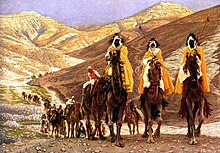Caspar

Casper, a variant of Caspar, is considered one of the traditional names of the Biblical Magi (Kings). The name is derived from the ancient Chaldean word "Gizbar" meaning "Treasurer". The transition was Gizbar>Gasbar>Gaspar>Caspar>Kaspar. It, along with Gaspar, was ascribed by popular tradition in Europe to one of the three Magi. The supposed remains of the Magi were taken in the 12th century from Constantinople to Cologne, where they became objects of veneration.
|
|
| Gender | Male |
|---|---|
| Word/name | Chaldean, Old Persian |
| Meaning | "Treasurer" |
Casper (with the same sounding Kasper) is a family and personal name derived from Chaldean that means "Treasurer". The origins of the name have been traced as far back as the Old Testament and variations of the name have been adopted by a variety of cultures and languages.
The name is derived from Gaspar which in turn is from an ancient Chaldean word, "Gizbar", which according to Strong's Concordance means "Treasurer". The word "Gizbar" appears in the Hebrew version of the Old Testament Book of Ezra (1:8). In fact, the modern Hebrew word for "Treasurer" is still "Gizbar" (גזבר). By the 1st century B.C. the Septuagint gave a Greek translation of "Gizbar" in Ezra 1:8 as "Gasbarinou" (literally, "son of Gasbar"). The transition from "Gizbar" to "Caspar"and "Kaspar" can thus be summarized as: Gizbar>Gasbar>Gaspar>Caspar>Kaspar...with "C" being a misreading of the manuscript "G" and "K" having the same phonetic value as "C".
There are numerous modern variations such as Gaspar (Spanish and Portuguese), Gaspare (Italian), Gaspard (French), Kaspar (German,Dutch), Kašpar (Czech), Casper (English), Kacper/Kasper (Polish), Kasperi (Finnish), Kasper (Danish), Gáspár (Hungarian), Гаспар (Russian) and Kaspars (Latvian).
By the 6th century, the name Gaspar was recorded in mosaic at the Basilica of Sant'Apollinare Nuovo in Ravenna, Italy as one of the traditional names assigned by folklore to the anonymous Magi mentioned in the Gospel of Matthew account of the Nativity of Jesus. The letter "G" in the name Gaspar was clearly different from the letter "C" used elsewhere, suggesting that the name Gaspar preceded the name Caspar, and not the other way around as some have supposed.
The Western tradition of the name Gaspar also derives from an early 6th Century Greek manuscript, translated into the Latin "Excerpta Latina Barbari". A pseudo-Venerable Beda text, called "Collectanea et Flores", apparently continues the tradition of the name Caspar: "Secundus nomine Caspar" (P.L., XCIV, 541). This text is said to be from the 8th or 9th century, of Irish origin. As a surname, Gaspar survives today in Italian, Spanish, Portuguese and French, although the latter adds a silent d. It also survives in the Armenian name, Gasparian.
...
Wikipedia
